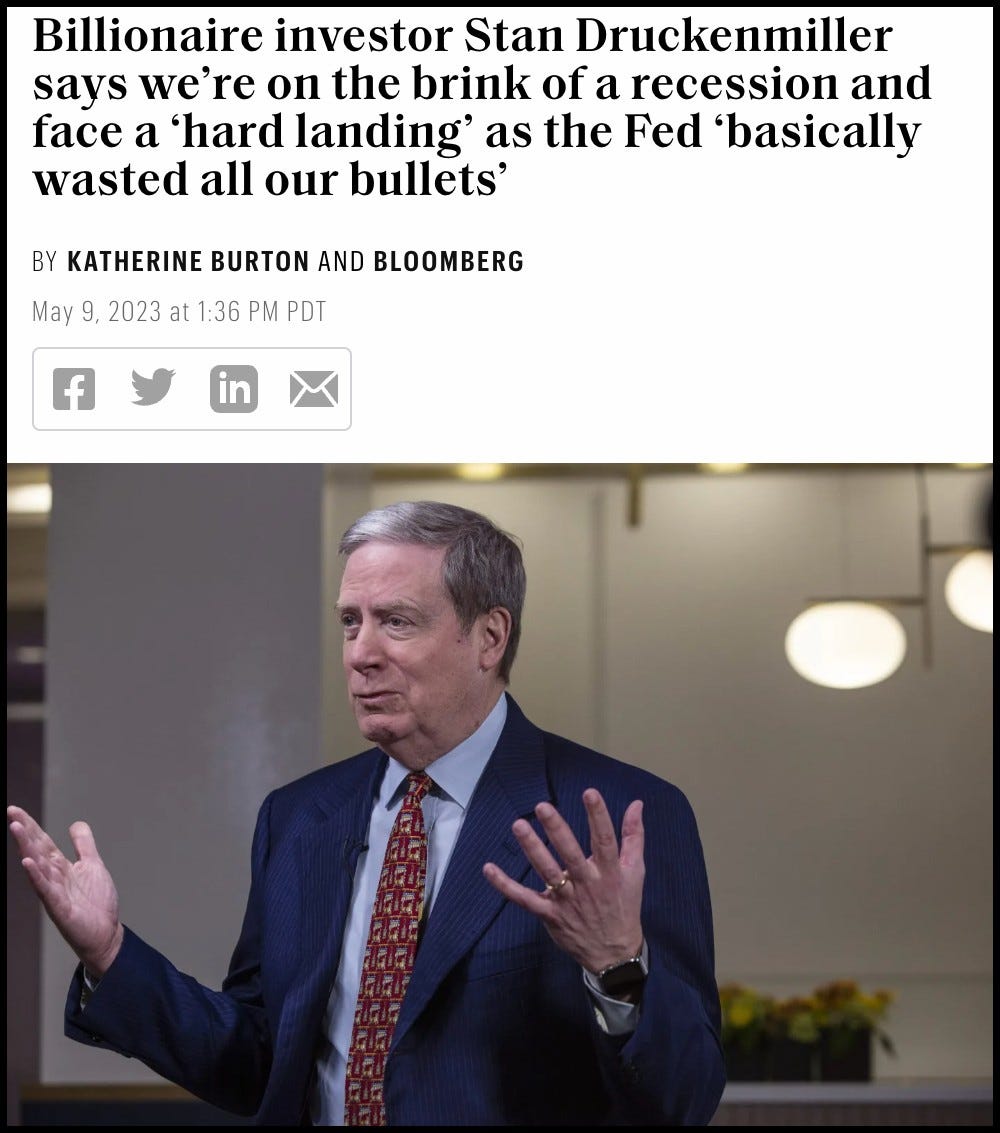When Is the Market Crashing?
[4 minute read] The market has so far defied widespread expectations of an impending crash, so when is it actually crashing?
Over the past year, the Federal Reserve has made money significantly more expensive (0% to 5% interest rate) and is actively pulling money out the economy by allowing up to $60 billion of treasuries and $35 billion of mortgage-backed securities to “run off” its balance sheet each month.
When money is suddenly drastically more expensive and the total money supply is shrinking, by all measures, the economy should slow down. A natural corollary to a slowing down economy is a market crash.
Don’t take my word for it, many prominent investors and market commentators agree, including:
Legendary and renowned investor Stanley Drunkenmiller
Morgan Stanley Chief US Equity Strategist and Chief Investment Officer Mike Wilson
SoFi's head of investment strategy Liz Young
Eminent investor Chris Davis
And many more
Despite the most rational analyses of the anemic state of the economy and market, the market has defied professional expectations and refuses to sell off.
The S&P 500 closed at 4205 on Friday. This is up almost 20% from its 2022 low of 3583.
Why hasn’t the market crashed?
On distant impression, the monetary situation is dire. The Fed keeps hiking interest rates and pulling money out of the economy. On closer inspection, it makes sense that it’s taking so long for signs of economic distress to appear. To be clear, I’m not saying that the present day situation is easily predictable a year ago given the novelty of the financial environment we find ourselves in, it’s simply important to understand how we got here to better prepare ourselves for the future.
Here’s why stocks refuse to go down:
The economy still has a lot of pandemic dollars circulating around, despite the best efforts of the Fed to pull it back
Corporations took advantage of the unusually low interest rates during the pandemic to load up on cheap debt
“Companies borrowed a record $1.3 trillion [in 2020] but took a cautious approach towards spending it, which left them sitting on some $5.2 trillion in cash” - Janus Henderson, asset management company
Corporations are, unsurprisingly, very good at defending their earnings
Revenues have started to decline or slow (e.g. last year, Meta not only had their first ever quarter of negative YoY quarterly revenue growth, they actually reported 3 consecutive quarters of negative revenue growth. Apple recently saw 2 consecutive quarters of negative revenue growth as well), but corporations are really good at shoring up their bottomline, primarily by cutting costs and raising prices
Unless a major negative event happens, everyone’s default action is to buy and this incessant but gentle buying pressure is the market’s “cosmic background radiation” that is a major reason why prices are levitating right now
So when?
This brings us to the titular question: when is the market actually going to crash?
The current market situation is best described as a slow moving train wreck. The first casualties from rising interest rates were real estate and Silicon Valley startups. Regional banks were next, with many becoming insolvent as their earnings calls revealed distressed balance sheets filled with underwater treasuries. The ensuing panic triggered bank runs that made a bad situation catastrophic.
However, a slow moving train wreck doesn’t deter investors that have been conditioned by the past two decades to keep buying. This has been a major force in propping the market up despite the, albeit slow, stream of bad news.
At FinanceTLDR, we expect the next year to be very choppy in the markets as the chickens come home to roost from the Fed’s drastic anti-liquidity measures in the last year. In fact, the Fed is expected to continue hiking rates with the economy still running hot. When it’s time for the government and corporations to start raising more cash through debt, they’ll find it a lot less palatable with interest rates being so high. The next cycle of debt raising/refinancing will be when the pain of the new interest rates really hit the economy.
In addition, there are still more parts of the economy that are supposed to fail, but have so far defied expectations. This is from Elon Musk in a recent interview:
“We really haven’t seen the commercial real estate shoe drop. That’s more like an anvil, not a shoe. So the stuff we’ve seen thus far actually hasn’t even — it’s only slightly real estate portfolio degradation. But that will become a very serious thing later this year, in my view.”"
Finally, as the stock market tries its best to keep the party alive, the bond market refuses to turn up. The yield curve has been inverted since July of last year and just last week, short-term interest rates started spiking even as the S&P 500 rallied.
The bond market is predicting a hard landing that will come sooner or later. We agree. In summary, don’t get complacent from the recent stock market revelry. The worst is yet to come.



